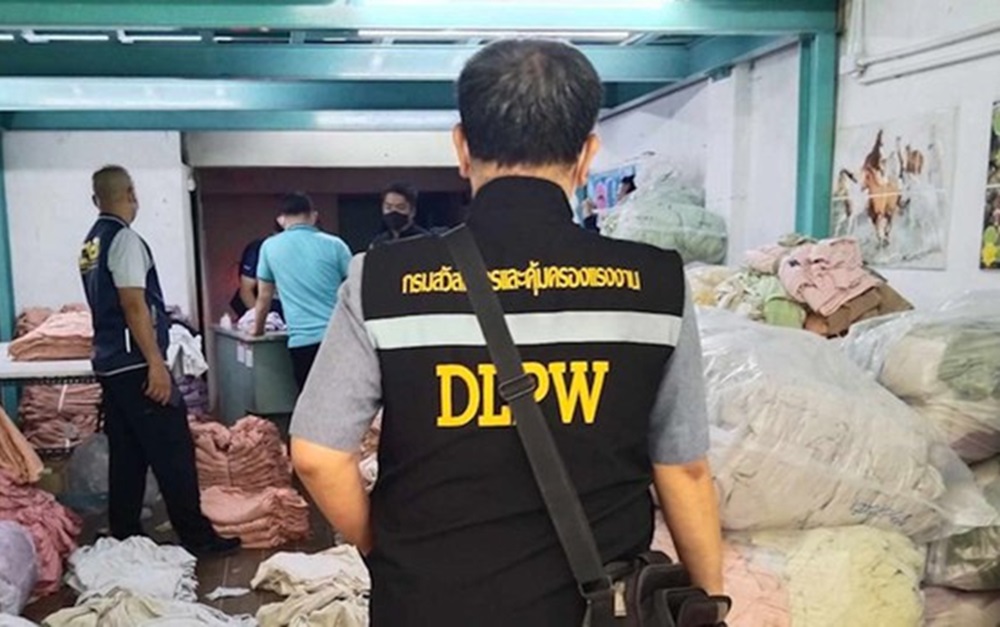News
Bangkok Textile Factory Raided After Enslavement 10 Myanmar Workers

Ten women from Myanmar rescued from a Bangkok textile factory said they were detained against their will for months and forced to pay “fees” that would have kept them indebted to their employers indefinitely.
The women, who included both legal and illegal workers, are just a few of the “millions” of Myanmar citizens who moved to Thailand in search of work following the military’s Feb. 1, 2021, coup.
According to rights groups, they are among the most vulnerable populations in Thailand since they lack proper protection from authorities both there and at home.
Thai police, in collaboration with the labour activist group Myanmar Humanitarian Action Centre (MHAC), liberated the women from Myanmar’s Sagaing and Bago areas from a chamber where the Thai owner of the textile plant had held them when they weren’t working.
According to Ye Min, the center’s director, the women contacted MHAC via Facebook Messenger for assistance, uploading images of their room and living conditions.
“They sent photos of the room in which they were imprisoned.” “We used these photographs as evidence,” Ye Min explained. “We contacted an official Thai NGO – the Labour Protection Network – and authorities to rescue them.”
Police freed the women and filed charges against the factory owner under Thai law for failing to pay the minimum wage and confining the 10 against their will.
One of the victims, Kyi Kyi Sein, spoke with Radio Free Asia about her incarceration from a women’s care facility in Bangkok, where the ten are being held while officials investigate their case.
She stated that she moved to Bangkok on 17 July after learning that she had been hired by the textile business and that she had agreed to enable the owner to deduct 3,500 baht (US $100) from her monthly wage to cover “fees” for transport and the use of a “employment agency.”
“Only when we arrived here, the owner and management of the factory forced us to sign an employment contract and said they would only allow us to go outside after working for two years,” she went on to say. “It was against the rules for us to leave after that point.” We weren’t even able to eat out.”
Sein sadi that she and her fellow migrants worked long days with no guarantee of pay.
“We were asked to start working at 7:30 a.m. and allowed to take a lunch break at 12:10 p.m.,” she explained. “We were scheduled to work until 5 p.m., but were summoned 30 minutes later to begin the night shift, which ended around 10 p.m.”
The employer never indicated the specific amount of income [he would give us], but insisted we could earn anything we wanted.”
The labourers, according to Sein, lived in a room on the top floor of the same textile facility where they worked.
“Each floor had a CCTV camera, so we couldn’t escape,” she went on to say. “We could cook in the room, but had to ask others to buy groceries for us.” The factory owner attempted to obtain their’ Myanmar national ID cards, but they refused.
“At that point, he threatened to fire us, and demanded that we pay back 15,000 baht ($425) for transportation fees [from Myanmar to Thailand],” she went on to say. “When we told him we didn’t have the money to repay it, he offered us 500 baht ($14) [per month] to stay at the factory while we looked for other work.” We simply couldn’t afford it.”
Sein stated that she and her coworkers were “afraid of getting arrested” for failing to pay the owner, so they sought assistance from the Myanmar Humanitarian Action Centre. According to Ye Min of MHAC, seven of the ten women have legal permission to live and work in Thailand, while the other three are undocumented.
He claimed that, following the military coup, a growing number of Myanmar residents have sought legal or illegal abroad employment due to economic difficulties and high unemployment rates.
“In other, more tragic cases, some … were sold as slaves on fishing boats and young women were sold to human trafficking rings at the Malaysian border [with Thailand],” he went on to say. “The military coup has ruined our country, forcing people to migrate to Thailand, where they face tragedy.”
Meanwhile, a recent Bangkok Post story, around 400,000 documented workers from Myanmar came to Thailand in the aftermath of the military coup. However, labour activists estimate that there are “millions” of documented and undocumented Myanmar workers in Thailand.
The International Organisation for Migration reported in December 2022 that almost 40,000 people from Myanmar had moved to other countries as a result of the COVID-19 pandemic, as well as the political and economic consequences of the coup.
Air Canada Resumes Directs Flights from Vancouver to Bangkok
Air Canada Resumes Directs Flights from Vancouver to Bangkok































